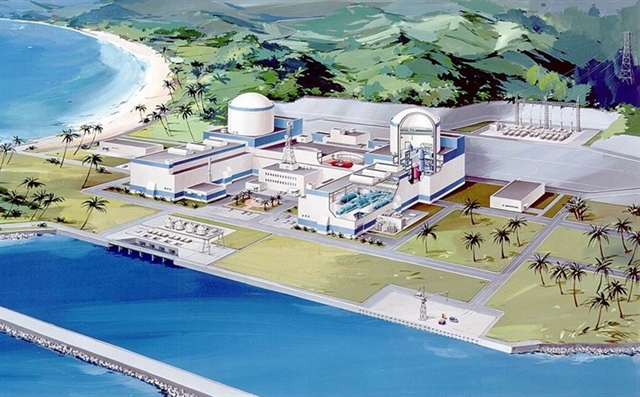
HÀ NỘI — The National Assembly Economic Committee has proposed the Government remains committed to plans for two nuclear power plants in the central province of Ninh Thuận instead of scrapping the project altogether, for the sake of future development potential.
This is one of the committee’s proposals included in its report to the plenary session of the ongoing third session of the 15th-tenure NA, with regards to the implementation of NA’s Resolution 31 issued in 2016 on the halting of investment into Việt Nam’s first planned nuclear project in 2016-21.
As of the resolution’s effective date, November 22, 2016, nearly VNĐ2 trillion have been spent on seven components of the projects, including research and study for planning, ground clearance and relocation, constructions of some buildings, as well as sending Vietnamese engineers to Russia for training.
The committee noted that while the project has been halted, there are still standing issues planning-wise to stabilise the livelihoods and accommodation of the local people who had to relocate. Many who had their lands within the allocated zone for the nuclear plant said their rights to use these plots have been severely restricted – some are not allowed to build houses, upgrade their houses, or transfer the use rights to their heirs – while the project is in limbo.
The economic committee stressed that nuclear power should be a serious consideration in Việt Nam’s power development planning, to realise the country’s recent commitment to achieving net zero emissions by 2050 at 2021 United Nations Climate Change Conference (COP26), and to ensure national energy security and development of an independent, self-reliant, with diversified power sources.
Nuclear energy is seen as a source of clean, low-carbon electricity source that could contribute to the greenhouse gas emissions reduction, it remarked.
The committee said Việt Nam has signed many agreements and international commitments for the development of nuclear energy and usage of nuclear power for peaceful purposes – especially with Russia and Japan who have agreed to fund the construction and operations of the power plants in Ninh Thuận, as well as provided training for Vietnamese human resources.
The selection and the integration of the nuclear project into local and national-level planning was a meticulous, time-consuming, costly, but standards-compliant endeavour that has received the approval of the local authorities and local populations, the economic committee noted.
The project has not been suspended for long, and annulation of the project would seriously affect the potentials for nuclear development in Việt Nam in the future, as well as result in adverse ramifications in cooperation relations with Việt Nam’s partner countries, it added.
The committee urged the Government to consider keeping the sites designated as the two power plants in its planning until further policy orientations for nuclear power development crystallise.
It urged the Communist Party of Việt Nam and relevant bodies to issue policy orientations on nuclear development, based on which, the appropriate timing for the restarting of the Ninh Thuận nuclear electricity project could be decided.
However, no matter the final decision on whether to go ahead with the project, there must be immediate measures to resolve locals’ complaints and livelihoods issues, as well as provide specific support packages for the people affected by the project aside from general socio-economic development policies and policies.
The project for two power plants in Ninh Thuận with total capacity of 4000MW was approved by National Assembly in 2009, halted by 2016. The Government said at the time that the reasons were economic, as Việt Nam's limited resources should be spent on critical infrastructures, or "higher priority, more effective" renewable energy sources like solar or wind powers instead.
However, to date, the Government and the Ministry of Industry and Trade have not yet decided on the termination of the project’s planning and free up or convert the land areas marked for the nuclear plants into other purposes.
Minister of Industry and Trade Nguyễn Hồng Diên earlier this week stressed the legislative body only voted on the cancellation of the project, not its termination.
The ministry, partners and related sectors have carefully studied and confirmed that Ninh Thuận is the most suitable location for nuclear power development in Việt Nam, he noted.
In order to exploit renewable energy sources such as solar and wind energy, a stable power system is needed. Current power supplies in Việt Nam mainly come from coal-fired or hydroelectric plants. However, coal-fired power plants no longer have the conditions to develop, and there is also no room to develop hydroelectricity. Therefore, it is essential to look towards nuclear power, Diên said, adding that many countries have started to reverse their decisions on walking back on nuclear
But the decision to go on with nuclear power will need higher authorities' approval. — VNS
Xem thêm: lmth.tcejorp-tnalp-raelcun-gnipeek-sesoporp-eettimmoc-cimonoce/6677021/swal-scitilop/nv.swenmanteiv